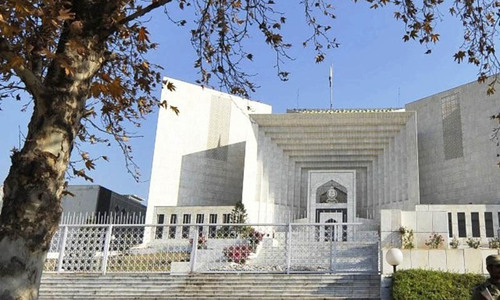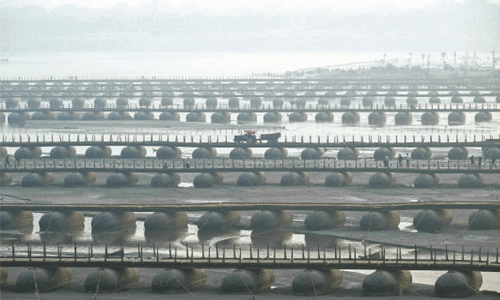ISLAMABAD: “We are independent, yet we are also dependent on others at the same time,” observed Justice Syed Mansoor Ali Shah with a smile on his face while rising for the day after attending tax-related cases in the Supreme Court on Friday.
The observation came when the judges were retiring for a short break during court proceedings, but no usher (“Farishtai” in local parlance), was present in Courtroom No 5. The two-judge bench consisted of Justice Mansoor Ali Shah and Justice Yahya Afridi.
The usher helps judges don or doff their black gowns and pull their chairs to let the judges sit comfortably before the commencement of a hearing or rise after the day’s proceedings and open or close the doors behind the bench to let the judges step outside.
But on Friday the attendants were not inside the room when the case was being heard. Subsequently Justice Shah and Justice Afridi turned to see behind their chairs, but found no attendant in sight.
A court associate rushed outside to call the attendants, but by the time one of them entered the room, the judges were already on their feet and looking towards lawyers, who too were waiting for the doors to be opened.
And when the attendant tried to open the door, he found out that he was not tall enough to enable his hands reach the bolt. However, another court staffer, standing beside the attendant, opened the door.
“We are independent. Yet we are dependent on others at the same time,” quipped Justice Shah while leaving the court.
“It’s a tradition indicative of the aura and dignity of the judicature at the highest level,” commented counsel Muhammad Akram Sheikh.
This practice is strictly in accordance with colonial tradition, but it is not practised in US courts as Americans tend to shun pomp and ceremony, he observed.
“Unlike our system, in the US judges even sit with members of the bar,” Akram Sheikh said. “Our courtrooms have taken Britain as their model. There the first three lines are reserved for the Queen’s Counsel (QC) and no client can sit on them. These lawyers also take precedence during court proceedings.”
In the United States, they have even brought about a fundamental change in the Supreme Court bench by doing away with the custom of having an elevated floor for judges and a lower one for lawyers.
There, he said, judges and lawyers communicate with each other sitting across the table.
“I have not found such formalities in Canada or Australia, but it does not mean that judges have no respect in those countries,” Akram Sheikh said.
Another senior lawyer said the practice of attendants pulling chairs for judges to sit or rise was “a reminder of a colonial era now long dead”.
Published in Dawn, November 9th, 2019














































